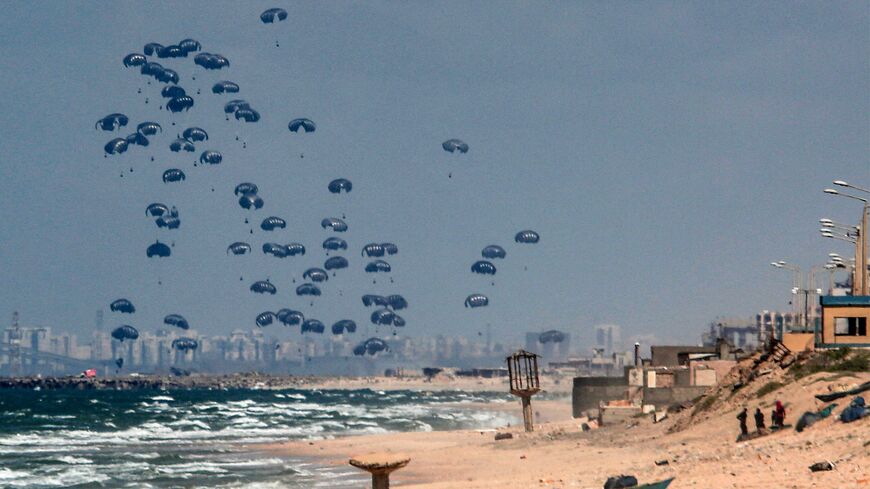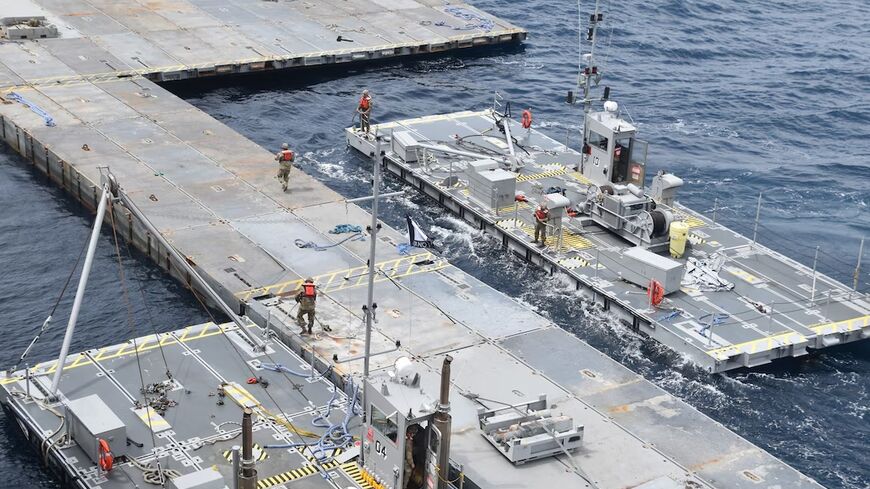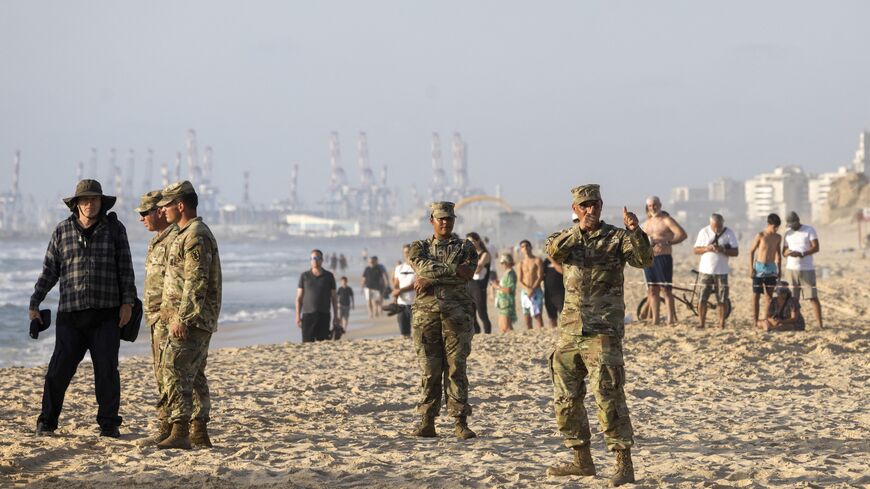US military begins construction on humanitarian aid pier off Gaza
Mortar shells rained down on a section of Gaza’s coast on Thursday, underscoring the risks inherent in the Pentagon’s plan to rely on the Israeli military to provide security for humanitarian pier as the US seeks to stave off famine.

WASHINGTON — The Pentagon is moving ahead with plans to set up a temporary pier off Gaza’s coast in order to facilitate humanitarian deliveries, despite a mortar attack on Thursday that struck an area designated for marshaling aid shipments.
Mortar shells rained down as Israeli soldiers accompanied United Nations officials to tour the onshore site on the coast of central Gaza, forcing them to seek shelter, Israeli press reported.
Nonetheless, US officials on Thursday said the Biden administration’s plan to rely on the Israeli military to provide security for the temporary port remains on schedule.
American military ships began constructing the causeway and pier several miles off Gaza's coast on Thursday, with expectations that it will be anchored to the shore and ready to facilitate deliveries by early May.
At peak capacity, the US-built pier system is expected to eventually enable commercial ships to deliver upwards of up to 150 aid trucks per day, supplementing cross-border aid deliveries that have been held up by Israeli restrictions, damaged roads and lack of security elsewhere in Gaza.
The Biden administration is seeking to bypass those obstacles in order to avert a famine in the Palestinian enclave, though humanitarian aid officials have warned it has already likely begun.
“Everything is in place,” a senior US military official said on Thursday, adding that US Central Command has agreed with the Israeli military on a "comprehensive, integrated security plan” to protect the maritime aid corridor.
The official, like others cited in this article, briefed reporters on the condition of anonymity.
The IDF has dedicated a brigade with thousands of soldiers to secure the beachhead and surrounding area, while the Israeli Navy and Air Force have assigned ships and aircraft to patrol the waters and skies, the senior military official said. The IDF on Thursday publicly confirmed it will provide security and logistics support for the operation.
The IDF will anchor the US military-built pier into the shore once constructed, after weeks of training alongside a US Army engineering team further north on Israel’s coast.
Once it is anchored, US military personnel will operate small ferry ships, known as LSVs and LCUs, to deliver aid trucks to the end of the pier several hundred meters from shore. From there, drivers contracted by the UN’s World Food Programme will deliver aid pallets to distribution hubs throughout Gaza, one US official said.
President Joe Biden has vowed no US personnel will go ashore in Gaza.
Yet the mortar attack on Thursday seemed to portend that the Israeli military’s presence on the beachhead was at least as likely to attract hostile fire from Hamas as deter it.
Pentagon officials on Thursday sought to downplay the concerns, emphasizing that no US assets were harmed in the mortar attack because American ships and personnel remained several miles off shore, well out of range.
“We don't assess that the attack had anything to do with the JLOTS mission, or delivery of humanitarian assistance from the sea,” the senior US military official told reporters.
Pentagon press secretary US Air Force Maj. Gen. Patrick Ryder said barrage caused "minimal damage," but offered no details. He referred further questions to the Israeli military.
“The incident in no way delays our efforts to establish the maritime corridor," Ryder said. The IDF blamed terrorist groups for the attack, though no Palestinian faction has claimed credit.
The incident was not the first setback for the nascent maritime aid operation.
Humanitarian organizations have expressed serious concerns about participating in the US-coordinated operation, including over safety and maintaining neutrality while working with the Israeli military.
A wide host of international bodies, including the United Nations, European Union, Oxfam and Human Rights Watch have accused Israeli government of using hunger as a weapon of war by deliberately impeding the flow of humanitarian into Gaza.
UN experts and aid agencies have also accused Israeli forces of having opened fire upon or shelled aid convoys and civilians gathered to receive aid in numerous instances throughout the current Gaza war. The most high-profile incident was a triple-tap drone strike on a World Central Kitchen food convoy near Deir al-Balah that killed eight aid workers on April 1.
Earlier this month, Israeli military officials requested the pier location be moved further south, closer to an IDF security cordon.
“The IDF is deployed on the ground over a fairly wide area to provide the force protection in a very integrated way,” the senior US military official told reporters.
There are also concerns among aid agencies that the Israeli military may turn the humanitarian port area into a permanent military base once the US operation has finished, Al-Monitor’s sources said.
US CENTCOM commander Gen. Michael “Erik” Kurilla may yet decide to move the location of the planned beachhead “based on the security situation at the time.”
“We reassess security every single day,” the senior US military official said.
“It's very clear that it's a very difficult environment for humanitarian workers in Gaza, just given the state of the conflict,” a Biden administration official, also speaking not for attribution, told reporters.
“The broader issue is the safety and security of our partners and just making sure that the deconfliction systems are working well,” the official said.






